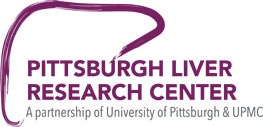
Kari Nejak-Bowen, MBA, PhD*
S405A Biomedical Science Tower
200 Lothrop Street
Pittsburgh, PA 15261
Liver-Related Work
Research Interests: My primary area of research is in understanding the molecular mechanisms of cholestatic liver disease and porphyria, for which there are few effective medical therapies available. Specifically, I study the complex role of the Wnt/beta-catenin signaling pathway in the progression of injury and fibrosis. We have three projects in this area. 1) In the first project, we are studying the impact of inducing hepatocyte-to-biliary reprogramming in order to augment bile flow and reduce biliary injury in models of chronic cholestasis or bile duct paucity, such as Alagille syndrome. We believe that our expertise with models that allow for the tracing of specific cells, in combination with multiple mechanisms for inducing cholestasis and genetically altered mice that will allow for promotion of reprogramming, afford us a unique opportunity to address these questions. 2) In another project, we are determining the fate of these reprogrammed hepatocytes by assessing their ability to transform into either hepatocellular carcinoma or cholangiocarcinoma (CCA). We have developed several models of CCA, some of them unique to our lab, and also plan to investigate the mechanism and progression of this understudied disease. 3) In the third project, we are studying the role of beta-catenin in porphyrias, which are rare disorders caused by deficiencies in heme biosynthesis pathway enzymes. Previously, we showed that suppression of beta-catenin led to lesser liver injury and biliary fibrosis in a mouse model of chemically-induced porphyria. In collaboration with other institutions, we are testing our Wnt inhibitor in several genetic models of erythropoietic and acute intermittent porphyria to determine if it can can prevent progression or provide protection in these clinically-relevant models as well. We are also studying the therapeutic benefit of enhancing autophagy to clear protein aggregates and accumulated toxic intermediates of heme biosynthesis during porphyria.
NIH Research:
View Dr. Nejak Bowen’s Report on nih.gov
Selected Publications:
View Dr. Nejak Bowen’s publications on PubMed
Ongoing Research Studies:
- Collaboration with Dr. Paul Monga, Vice Chair Division of Experimental Pathology, on the role of the Wnt/beta signalling pathway in cholestatic liver diseases, especially in hepatobiliary repair and transdifferentiation.
- Collaboration with Dicerna Pharmaceuticals for pre-clinical testing of β-catenin shRNA lipid nanoparticles in models of biliary fibrosis.
- Collaboration with Dr. Jake Demetris, Transplant Pathology, to analyze serial biopsies from post-transplant PSC patients for b-catenin localization as a surrogate for FXR activity.
Available Tools:
Mouse models:
- Mdr2 KO (FVB background)
- Mdr2 KO (C57Bl/6 background) tamoxifen inducible Sox9-Cre
- S45D β-catenin-mutated mice (C57Bl/6 background)
Cell lines:
- Hep3B
- HepG2
- AML12
- primary mouse hepatocytes
- Raw264.7
- sm-cc (mouse-derived immortalized cholangiocytes)
Techniques:
- bile duct ligation
- liver perfusion
Associate Professor, Department of Pathology
Director of Enrichment Programs, Pittsburgh Liver Research Center
